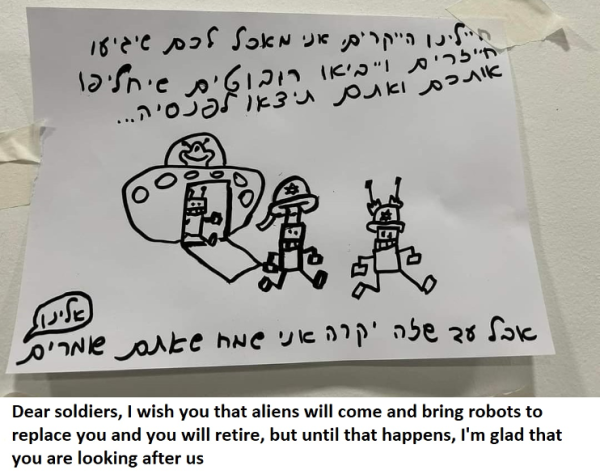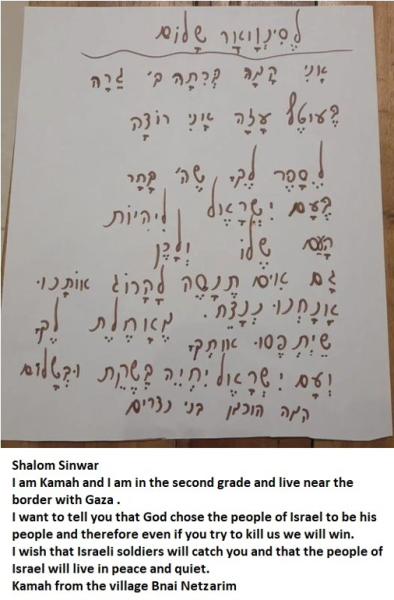By Leah Garber
The Children of October 7
On October 6, the children of Israel went to sleep after a comforting bedtime story. They heard about fairies and superheroes, about princesses and castles, puppies and balloons. Mom and Dad sang soft lullabies and sent their young ones off to sweet dreams with loving kisses.
When the children awoke on the morning of October 7, it was to a nightmare—sirens, explosions, screams of terrorists calling out in Arabic for the massacre of all Jews. Some were brutally abducted still in pajamas, dragged into the darkness of Gaza, their parents and beloved teddy bears and toys left behind. Some were injured, others saw their parents tortured, murdered, or kidnapped. Some were saved thanks to the dead bodies of their parents that sheltered them—a last act of bravery and love.
Many saw their homes violently ransacked or burned to the ground. The red swing Dad had built was on fire; the newly planted flowers in the garden were washed away in a river of blood; toys were burned beyond recognition and a favorite doll no longer smiled; a shiny train no longer ran on its track; and mom is crying.
So many—too many—are now angels, including a fetus that did not get to complete nine months of pregnancy, and before it took its first breath, was severed cruelly, violently, from its mother’s womb. These beautiful, tiny angels are now floating in infinite sadness between the imaginary world of yesterday’s fairies and today’s scorched soil of home.
On October 7, countless children woke up to a horrible, cruel, and unimaginable reality. They will never again be the children of October 6.
In the 132 days that have passed since then, these children have grown up, matured too fast. Their eyes bear imaginary lines of sorrow; their broken hearts have aged; their sweet dreams have been shattered.
Yagil Yaakov, a knife to his throat, was kidnapped to Gaza with his brother and their father. He thought the terrorists would kill him. Cloaked in unthinkable fear, he was unable to cry, only to scream. As he was dragged into Gaza, he saw it all—bloodied bodies, burned homes, destruction, death. Yagil was held captive for over 50 days, and throughout each long, lonely one, he never lost hope. He knew he would get back home. Yagil and his brother were returned in the first release of hostages. Their Dad, it was announced today, after 132 days of waiting and hoping and praying, is among the dead.
Ilai Butelman was in his family’s safe room with his mother and sisters. During those terrifying hours, without knowing what was going on outside, they heard the screams and smelled the smoke. Ilai texted with his best friend—until his friend stopped responding. Only later did Ilai learn that as the two were texting, his friend’s house was set ablaze, and he was murdered in the fire. Ilai, holding the door handle to the safe room so the terrorist couldn’t get in, texted this: “This is it. It’s the end. Bye.”
Isan Margalit’s grandfather was murdered on that day. His aunt was taken to Gaza.
Yagil, Ilai, and Isan grew up together on Kibbutz Nir Oz and now live in Kiryat Gat, a temporary home for Israeli refugee families. They have no homes to which to return. Their class at school will never be the same again. Even though they ride bikes around Kiryat Gat, every noise seems like a gunshot. They smile, but what they experienced belongs in a horror story unsuitable for children. It will take a long time for the physical and mental scars to heal—if they do at all. These friends lost other friends, family members, and neighbors. Most of all, they lost their childhood.
Even the children who were not directly exposed to the horrors of October 7 are different. Dad is in the army and the kids already have forgotten how things work in a two-parent family. Mom looks at them strangely, trying to preserve every smile. She hugs more often, tighter, and wipes away tears, hiding her sadness, whispering that she will always be here for them.
They hear talk of missiles, terrorists, war, and hostages. They know how to run to shelters when they hear sirens, how to leave the car quickly, and lie on the ground if the siren goes off when they are riding in the car with Mom. And even though they are told not to, they worry. They, too, are not the same kids anymore.
Children—all children—want to return to the comfort of the bedtime stories they so love, but the horrific reality is scarier than any children’s fairy tale and the explosions are louder than any childhood lullaby. Their childhood, too, was stolen from them 132 days ago.
In their sweet innocent naiveté, they manage to express their concerns by writing and drawing, as these two examples show.


One day the sun will shine again on Kibbutz Nir Oz and on the other kibbutzim and towns in southern Israel. The birds will return to nest in tree tops that have recovered from their burns, and children will once again paint with all the colors in the paintbox. They will go back to reading fairy tales about princesses and castles, and they will create beautiful, happy pictures in red and yellow and pink.
Together, united, we will overcome.
Leah Garber is a senior vice president of JCC Association of North America and director of its Center for Israel Engagement in Jerusalem.
Reader Interactions